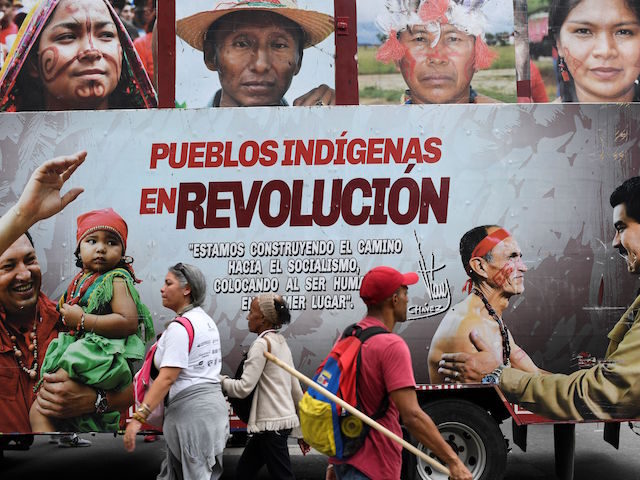CARACAS, Venezuela – Since its inception, the “Bolivarian, Socialist, Anti-Imperialist, and profoundly Chavista” Revolution has stylized itself as a champion of the downtrodden, a reclaimer of rights for the dispossessed, a voice of the voiceless, and as a paragon of human rights.
When it comes to Venezuela’s indigenous population, the socialist regime claims to be all that and more and, at first glance, it may appear true. The chavistas rewrote our constitution in 1999 to enshrine special provisions for indigenous people. The socialists established a special day to celebrate indigenous children. The government bureaucracy expanded to include an “Indigenous Ministry” and dictator Nicolás Maduro has passed laws to allegedly protect their lands and rights.
To give “justice” to their ancestors, the socialists toppled statues of Christopher Columbus, removing some altogether, bringing the evil “colonizer” to trial over 500 years later — way before Antifa and the radical left made this sort of thing cool in the United States. Renaming Columbus Day to Dia de la Raza (“Day of the Race,” or day of the indigenous)? The regime also did that way before the current global debate on the legacy of the explorer.
Yet, the truth of the actions of the Venezuelan socialist regime and the fruits of their labor tell a different tale, one of misery, hunger, and poverty amidst the ongoing collapse of this once celebrated ideological project. Venezuela’s indigenous population is among those struggling the most with the inevitable aftermath of socialism.
Venezuela’s indigenous population has been chased off its lands, been the victim of political persecution and brutality, all under the watchful eyes of a regime that masks its abuses by renaming roads and national parks in the name of indigenous rights, molding and reshaping the cultural legacy of what’s left of our country to suit its needs.
Nicolás Maduro’s establishment of a “mining arc” that spans over 43,000 square miles across the States of Bolívar, Amazonas, and Delta Amacuro has left the indigenous population living in that area in a state of defenselessness, vulnerable and in the middle of a struggle for gold between the military, armed forces, guerrillas, and others vying for power.
Reports on the ground have revealed that indigenous women and children living in that area are subject to sexual abuse and sold into slavery for a few grams of gold.
Asphyxiated by the devastation of their lands by out-of-control mining, political persecution, and the inhumane conditions that they’re now subject to has forced many among Venezuela’s indigenous population to flee the country, joining the ranks of the over 5 million migrants that have escaped from this ongoing calamity.
The Pemon indigenous group, in particular, has rebelled against Maduro. Constant skirmishes between the Venezuelan regime and the Pemon indigenous group have taken place over the past years. The Pemones are one of the groups that have suffered the most at the hands of violence.
They may count with a People’s Ministry for Indigenous Population, but they have no say or voice. The regime saw to that in early 2016 when it used its Supreme Court to render the opposition-led National Assembly void under the pretense that three of the representatives were elected through fraudulent means — all three representing indigenous populations.
To make sure that all of Venezuela’s indigenous people do not make the same “mistake” of voting for indigenous representatives who are not part of the Socialist Party, the regime has sought fit to change the rules and strip them of their right to vote freely and secretly for the upcoming rigged elections that will take place on the December 6. Changing the rules four months before the election is a clear violation of our electoral laws.
Our indigenous people have also been victims of the authoritarian brutality of this regime that many leftists turn a blind eye to. A recent case occurred in the month of April 2020 in the Guajira Municipality in the State of Zulia, where a protest carried by members of the Wayuu indigenous community was brutally repressed by the Bolivarian National Guard.
Without proper access to water and electricity, many of our indigenous people have had to face the Chinese coronavirus on their own. The socialist regime may have completely demolished the nation’s healthcare system outside of rural indigenous territories, but those of us in cities still have more than what they do at their disposal.
The international left has largely chosen to pretend these events did not happen. Maduro’s Venezuela retains a seat on the United Nations Human Rights Council, a darling of radical leftist groups around the world from the Chinese Communist Party to Black Lives Matter.
The smokescreen of useless bureaucratic gestures has worked. Why, supporters of the regime ask, would any indigenous people protest or demand food, medicine, and water from a socialist government when the regime just renamed Caracas’ main highway, replacing the name of a “Spanish colonizer” with that of a celebrated Venezuelan native chief? That should be good enough for them, right?
Christian K. Caruzo is a Venezuelan writer and documents life under socialism. You can follow him on Twitter here.

COMMENTS
Please let us know if you're having issues with commenting.